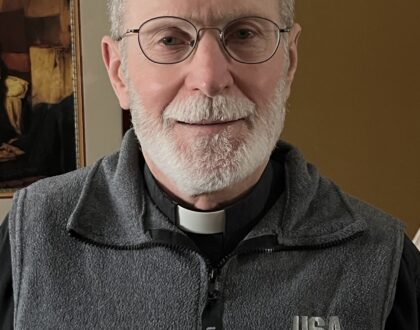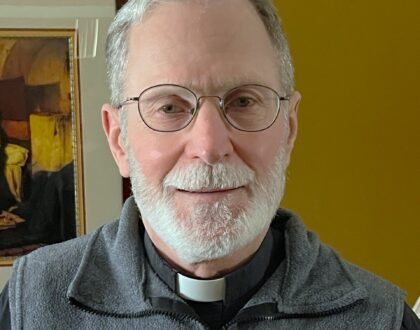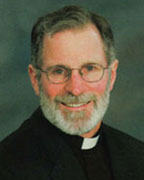Homily, January 21, 2024

From The Pastor
In church and religion, we use the words call and conversion. Both call and conversion are important movements in the spiritual life that lead to maturing faith and love for God. What these words mean in a mature spiritual sense is not often what is generally accepted in common human understanding.
In the best sense of the word, conversion is an encounter or awakening through a rich experience that leads to a new awareness and desire for God. True conversion awakens an inner love, a motive, and desire to change one’s life in the awareness of the living presence of God. Conversion is different than but related to repentance. The call to repent is to change one’s mind and/or the direction of one’s life in response to an experience of God. Moved by an experience of conversion through grace, a person will often repent and change their thinking and even their way of acting.
In the lesser sense, conversion is often thought of something I must do to turn from sin to avoid the risk of God’s punishment. Conversion is thought of as an act of my will, through my self-determination and hard work to be a better person in the eyes of God or others. It is something I do to avoid punishment, to be worthy of heaven, or to gain God’s favor. In themselves, none of these are bad things, but they are not conversion and they will not lead to a deeper relationship with God. Why not? Because they are motivated by human will through personal efforts to gain God’s good favor. They are not often motivated by love, but by what I believe I must do to attain or deserve God’s blessing, love, or favor.
Divine love is always a free gift, never dependent on human performance. Consider, ‘God is love and those who live in love live in God and God lives in them.’ I John 4:16. God’s call or identity in a person flows from this gift of love. True spiritual conversion is motivated and animated by an awakening to this love. Consider the difference: when you married you were motivated by the love you felt for and received from your beloved. In receiving that love, you desired to give your love in return to the one who loved you. Right? Do not look for perfection here, but structure. Look from the other side. You did not marry your spouse through an act of your will motivated by your self-determination with the expectation to serve your needs and wants. If you did, the marriage would not last or would bear only unfulfilled love. Right? Love is realized only in a willing surrender to the other motivated for the sake of love.
Consider the difference between the conversion of Jonah in the first reading, and the call of Andrew and Peter with James and John in the gospel. Jonah is in relationship with God and seeks to follow a Divine call. God calls Jonah to preach a message of conversion to the violent and warring Ninevite’s. Jonah hates the Ninevites because they conquered the Northern kingdom of Israel and sent any survivors of the conquest into exile. Jonah sets his will against the will of God. His desire is not directed by love, but by his anger and hatred for this abusive nation. The will of Jonah overrides the will of God. Jonah’s will to serve God is determined by his desire for God to destroy his enemies. The larger story of Jonah is not included today. Today’s account is God’s second call after Jonah’s encounter in the belly of a whale for three days. Still resisting, Jonah finally does as God calls and his work is completely effective. Why? Jonah surrendered his will and expectation and did as God had directed. Not perfect, he still did not like it, but in reverence (love) of God Jonah obeyed and accomplished God’s will.
The call of the early disciples is different. Why did they so immediately follow Jesus? This was not their first encounter with Jesus. There were several previous engagements with him. Why did they follow him? Their hearts were stirred and drawn by the conversion of love. Something in Jesus moved them deeply enough that they could not help themselves but to follow. They did not follow Jesus with a willful intention of personal gain. They were drawn by a love they could see and feel but could neither understand nor resist. Their hearts were grasped by an unseen love that was beyond any willful interest on their part. This is conversion at its finest. A surrendered yes to a love that grips the soul.
Conversion and the call of God are not determined by our willful desire, agenda, or expectation. Movements toward God that lead to spiritual growth are realized through willing desire for love alone. Because humans do not surrender easily, love is the only true motivation worthy of our personal surrender to another person or to Divine love. Otherwise, it is only for the sake of getting what I believe I need or want. There is no ‘I’ in God. God is a relationship of self-giving love.
Love is the true motivator of change. Look back on your life and consider the events, people, or experiences that you willingly surrender to for the sake of love, relationship, service, or self-giving. Marriage, children, the suffering or need of a loved one, actions of mercy or forgiveness come to mind. Next, do the same with God. What experiences, great or small, have lifted you beyond yourself stirring a love for God with a desire to surrender to God’s purpose in love. Resistance is inevitable, for good reason or bad. In the end, three things will last; faith, hope, and love, and the greatest of these is love.
Father John Esper
Recent Sermons

Homily, April 6, 2025
April 05, 2025

Homily, March 30, 2025
March 27, 2025

Homily, March 23, 2025
March 20, 2025

